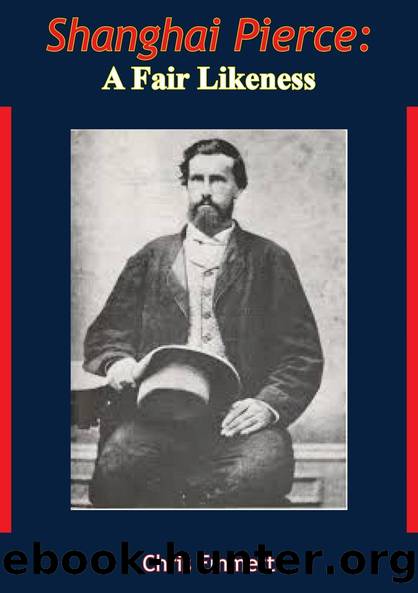Shanghai Pierce by Chris Emmett

Author:Chris Emmett [Emmett, Chris]
Language: eng
Format: epub
Tags: Biography & Autobiography, Criminals & Outlaws, Rich & Famous, Social Science, Ethnic Studies, Native American Studies, History, United States, 19th Century
ISBN: 9781787205680
Google: PA0qDwAAQBAJ
Publisher: Pickle Partners Publishing
Published: 2017-06-28T05:23:08+00:00
14. âI recognize no obligation under the contractâ
The effect of the prohibition elections in Texas had been to arouse a polyglot political situation in Wharton and adjoining counties. The impending trouble in Wharton County had been long in the making. When carpetbagger Republicans swept down into Texas after the return of Confederate Texans to their homes, Republicanism, in a form, stayed to fashion the destinies of the so-called âblack counties.â Few real carpetbaggers, in truth, played important roles in Texas politics, but the preachment of the âforty acres and a muleâ office-grabbers had taken the Negroes away from the Wharton, Matagorda, and Fort Bend County plantations. Negroes had become conscious of their numerical superiority. They became clay in the hands of the unscrupulous. Those who gave the Judas kiss were not wholly subscribers to the Republican hegemony. Some native Texans, even some Confederates, eschewing principle, took into their hands the certain means of controlling local elections, and they voted the Negroes en masse. When unscrupulous men ascended to political power, they used the Negroes to the fullest.
It was of this situation that Jonathan Pierce had written his brother after a Matagorda County election: âI hear we have two niggers and Alic Burkheart for commissioners...a very able sett endowed with great executive abilities.â
The political situation was even worse in Fort Bend County. As early as 1869, the Negroes, under the guidance of a few white men who called themselves Republicans, took over the political affairs in the county. Each year they held their convention, nominated a ticket, and regularly elected it. The Galveston News gave a picture of one such convention:
âThe presiding officer was J. C. Williams, white and heavy: William Reynolds, half white and short, was secretary. J. C. Smith, white and long, was doorkeeper.â
Out of this convention came nominee Walter Moses Burton, Negro, who was elected to the Texas senate, representing Fort Bend and Wharton counties. Seven years later, Fort Bend County again elected Negroes for sheriff, treasurer, county attorney, and justice of the peace. In 1880, Walter Moses Burton again went to the Texas senate, and he had, as co-legislator from Wharton County, Doc Lewis, also a Negro. It was in this latter contest that W. H. Burkhart was elected district judge. In 1882, Tom Taylor, a notorious cattle thief, became commissioner; and so it went for many years.
A cry of âgraftâ went up from the âoutsâ as the officeholders engaged in the construction of public buildings. The old courthouse was torn down, and a new, two-story brick structure, with clock and steeple aloft, took its place, but it did not reach higher than the cries of âgraftâ from Fort Bend citizens.
The second year after the Civil War, two young men left Matagorda in search of a new home. They stopped their horses in Richmond for a rest. Peareson decided to stay while Wells Thompson rode on to Columbus. There he came to dislike Bob Stafford.
At Richmond, Colonel Phillip E. Peareson associated with such men as Sid Winston, J.
Download
This site does not store any files on its server. We only index and link to content provided by other sites. Please contact the content providers to delete copyright contents if any and email us, we'll remove relevant links or contents immediately.
Wondrous Transformations by Alison Li(755)
Madame Figaro by 27 Janvier 2023(639)
William Tryon and the Course of Empire by Paul David Nelson(452)
If Wishes Were Coffee by Moore Michelle(427)
Tabloid Love by Bridget Harrison(416)
Growing Up Underground by Steven Heller(391)
Against All Odds by Alex Kershaw(390)
Jacob H. Schiff by Naomi W. Cohen(372)
Nephew by M.K. Asante(357)
Against All Odds: A True Story of Ultimate Courage and Survival in World War II by Kershaw Alex(354)
Bronx by Jerome Charyn(335)
From Loyalists to Loyal Citizens by Valerie H. McKito(334)
The Missionary of Wall Street: From Managing Money to Saving Souls on the Streets of New York by Stephen F. Auth(334)
Crossing Highbridge by Waters Maureen;(331)
Working on the Dock of the Bay by Michael D. Thompson(329)
Beware of Limbo Dancers by Reed Roy;(329)
Pioneer Mother by Hillary Brown(311)
Growing Up with Clemente by Peterson Richard;(311)
Studying Wisconsin by Martha Bergland & Paul G. Hayes(306)
